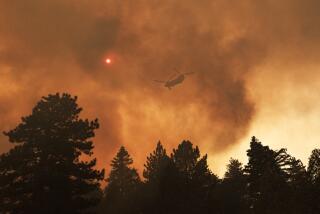China air pollution disrupts transportation
- Share via
Reporting from Beijing —
Whether it’s fog or smog, thousands of people have been delayed during the last few days by the almost-opaque air around Beijing Capital International Airport.
The delays since Sunday evening at one of the busiest, most modern airports in the world raise questions about whether air pollution in China has gotten bad enough to derail the country’s economic growth. Nearly 1,000 flights have been canceled and 10 highways in northern China had to be closed due to lack of visibility.
Chinese authorities say the murk is fog, purely a weather phenomenon, acknowledging only that there was “light pollution.” The U.S. Embassy in Beijing, which has its own air monitor on the roof, however, reported Sunday night that the index of fine particulate matter had soared to 522 micrograms per cubic meter, which is off the charts. (A reading between 300 and 500 is considered “hazardous.”)
Beijingers bought more than 20,000 face masks on Taobao, a shopping site; and people took to the Internet to mock their government’s reporting of air quality.
“They are treating citizens as idiots,” complained a young man on Sina Weibo, a Twitter-like microblog. A middle-aged man wrote sarcastically, “The city looks like a fairyland but thanks to the government, it is only ‘slight pollution.’”
The poor air quality Tuesday resulted in the cancellation of more than 370 flights. The U.S. Embassy monitor reported the particulate matter as “very unhealthy.”
“At least I would feel better if I were compensated in some ways,” said a technology executive, who gave his name as Lao Mo, sitting on an airport bench Tuesday and contemplating at least a six-hour delay for a business trip to Xian. “I don’t want to make a judgment about whether what they are saying about ‘fog’ is actually true.”
As of early Wednesday, many more flights were listed as canceled or delayed.
The Chinese government says that air quality is improving in Beijing and that the standards for “blue sky days,” meaning air that is at least acceptable, are met 80% of the time.
Steven Q. Andrews, an environmental consultant who has been monitoring Beijing air-quality reports since the 2008 Summer Olympics, released a report Monday accusing Chinese authorities of seriously understating the severity of the city’s pollution by failing to monitor all pollutants and moving monitors out of congested areas.
“In a recent study of over 500 cities around the world, the WHO found that urban areas in Mongolia, Madagascar, Kuwait and Mexico had the highest [fine particulate matter], but the pollution levels measured were only about half as severe as Beijing,” Andrews wrote, referring to the World Health Organization.
Unlike the American Embassy, Beijing’s Bureau of Environmental Protection does not track particles less than 2.5 micrometers in diameter, which experts said could penetrate lungs and other organs.
In recent weeks, Chinese have been clamoring for the government to adopt an international standard in reporting air pollution. Even the state-controlled news media have heaped scorn on environmental protection authorities.
“Suffocating smog has been covering Beijing like a greasy quilt recently,” the China Daily editorialized recently. “All of the residents in the city are aware of the poor air quality, so it does not make sense to conceal it for fear of criticism.”
Lee is an intern in The Times’ Beijing bureau.
More to Read
Sign up for Essential California
The most important California stories and recommendations in your inbox every morning.
You may occasionally receive promotional content from the Los Angeles Times.













